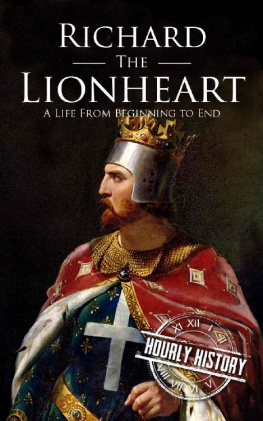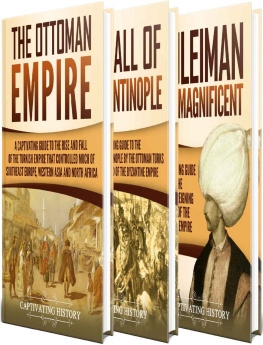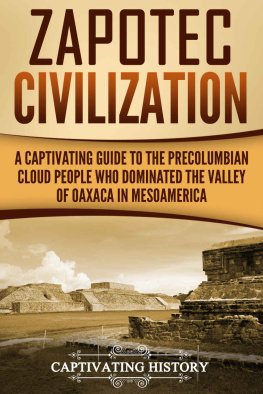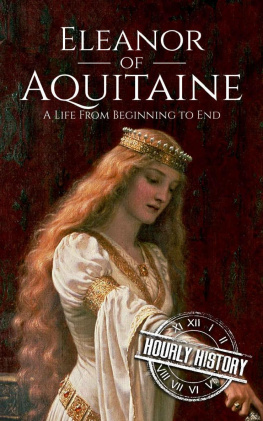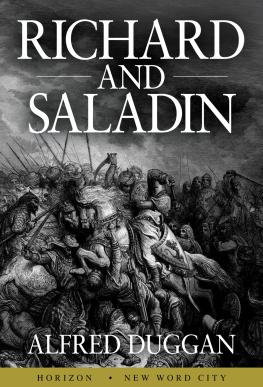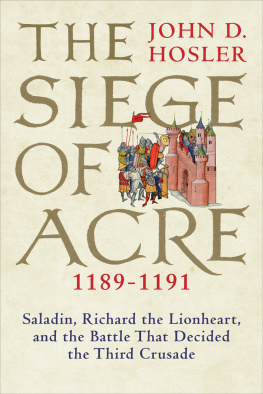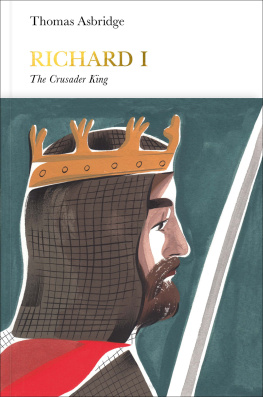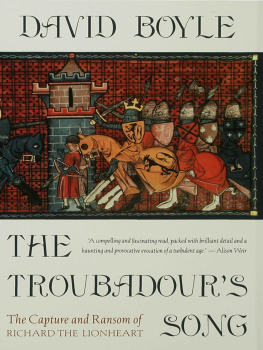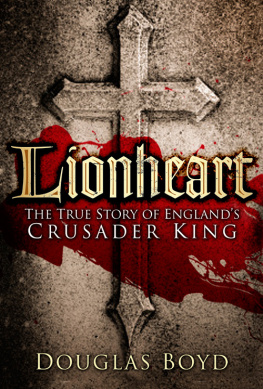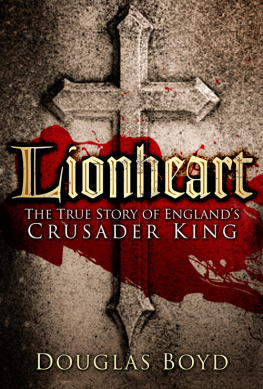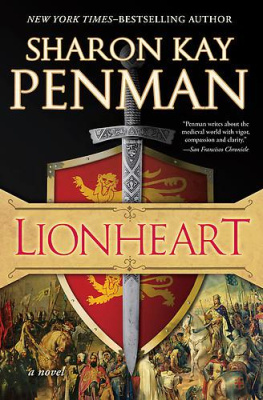History - Richard the Lionheart: A Life From Beginning to End
Here you can read online History - Richard the Lionheart: A Life From Beginning to End full text of the book (entire story) in english for free. Download pdf and epub, get meaning, cover and reviews about this ebook. year: 2017, publisher: Hourly History, genre: Non-fiction. Description of the work, (preface) as well as reviews are available. Best literature library LitArk.com created for fans of good reading and offers a wide selection of genres:
Romance novel
Science fiction
Adventure
Detective
Science
History
Home and family
Prose
Art
Politics
Computer
Non-fiction
Religion
Business
Children
Humor
Choose a favorite category and find really read worthwhile books. Enjoy immersion in the world of imagination, feel the emotions of the characters or learn something new for yourself, make an fascinating discovery.
- Book:Richard the Lionheart: A Life From Beginning to End
- Author:
- Publisher:Hourly History
- Genre:
- Year:2017
- Rating:5 / 5
- Favourites:Add to favourites
- Your mark:
- 100
- 1
- 2
- 3
- 4
- 5
Richard the Lionheart: A Life From Beginning to End: summary, description and annotation
We offer to read an annotation, description, summary or preface (depends on what the author of the book "Richard the Lionheart: A Life From Beginning to End" wrote himself). If you haven't found the necessary information about the book — write in the comments, we will try to find it.
History: author's other books
Who wrote Richard the Lionheart: A Life From Beginning to End? Find out the surname, the name of the author of the book and a list of all author's works by series.
Richard the Lionheart: A Life From Beginning to End — read online for free the complete book (whole text) full work
Below is the text of the book, divided by pages. System saving the place of the last page read, allows you to conveniently read the book "Richard the Lionheart: A Life From Beginning to End" online for free, without having to search again every time where you left off. Put a bookmark, and you can go to the page where you finished reading at any time.
Font size:
Interval:
Bookmark:
Copyright 2017 by Hourly History.
All rights reserved.
Richard I, commonly referred to as Richard the Lionheart, is best known today for his role in the legends and folktales surrounding Robin Hood, daring renegade and cunning thief of Sherwood Forest. In these stories, Richard is the beloved but absent ruler; his subjects all hope for the return of Good King Richard as they suffer under the tyrannical rule of Richards younger brother, Prince John.
While the tales of Robin Hook make the name of King Richard familiar to many today, the spread of heroic legends about the twelfth-century king is nothing new. In the Middle Ages, a popular story related how Richard gained his name by defeating a lion and pulling out its heart. Even Shakespeare referred to this legend in his play King John, Against whose fury and unmatched force. The aweless Lion could not wage the fight. Nor keep his princely heart from Richards hand. Stories of Richard circulated not only in western Europe but also in the east, among Richards enemies. Three Muslim historians of Richards day recorded his conflicts with the great medieval Muslim leader, Saladin. These men portrayed King Richard as a fierce and formidable opponent.
Despite the image of Richard as a good king and a mighty warrior, the actual account of his life might surprise many readers. For instance, though renowned as king of England, Richard spent less than a year of his reign on English soil. In fact, Richard never even learned to speak English fluently. His real attention was focused on his holdings in France and on his crusade in Palestine. In these places, he was enmeshed in wars and politics, both as a king and knight charging recklessly onto the battlefield and as the central figure of complicated negotiations.
This book does not attempt to describe the complex politics of medieval France and England, nor to explain the history of the Third Crusade or explicate its horrors. Instead, what you will find here is a picture of King Richard himselfa story of the decisions, events, and people that influenced the course of his life. You will find the king who rebelled against his father and made a pact with his familys greatest enemy. Richard was a charismatic leader, but at the same time, he insulted and angered many nobles, making plenty of enemies. He had to flee through Europe in disguise, survived captivity, and never lost his love of battle.
Many historians have questioned whether Richard truly was a good ruler of his lands and his people. In these pages, youll discover a king who was brave, a king who was daring and even reckless at time, a king who loved honor and glory. Youll see Richard the son, the brother, the sovereign, and the military leader. And as you read, youll realize that no matter what questions historians might raise about King Richard, no one can question that the story of his life is an unforgettable one.
The story of Richard I, the Lionheart, began in Oxford on September 8, 1157. His mother, Eleanor of Aquitaine, wife of King Henry II, gave birth to Richard in the countryside residence of Beaumont Palace. At the time of his birth, Richard was not marked to become the future king of England. He had two older brothersWilliam, who had died shortly before Richard was born, and Henry, who became the heir apparent to the throne. But despite not being born directly in line to become the next king of England, Richards place in twelfth-century Europe was still significant. He was a Plantagenet, a part of one of the most powerful families of the Middle Ages.
Richards father, King Henry II, rose to the English throne upon the demise of the heir of his predecessor, King Steven. Even before taking the throne, Henrys possessions and power were considerable. In the twelfth century, the area that is now France was divided into multiple provinces and feudal states. While most of these were nominally under the rule of the King of France, in reality, he controlled far less than a third of modern-day France. Richards father, Henry, presided over numerous provinces; the most important of these were Normandy, Maine, and Anjou, all in the northwest of France. Henry consistently and successfully fought to increase the Plantagenet domain.
Henrys marriage to Eleanor of Aquitaine in May 1152 brought even more of France under the Plantagenets sway. Eleanor was an intelligent, witty, and independent woman who stood to inherit power over the rich provinces of southern France, Aquitaine and Poitou. Henry was her second husband; in 1137, at the age of 15, she had married King Louis the Young of France. However, in the ensuing 15 years, this marriage had produced no son and heir for the French throne. Additionally, the relationship between sober, pious Louis and the vivacious Eleanor had been continually unpleasant to both, made worse by rumors of Eleanors unfaithfulness to the marriage. Whether these rumors had any veracity is unknown, but in any case, both parties desired to bring an end to their unproductive and uncomfortable union. They succeeded in doing this in early 1152, citing consanguinitya closer relationship by blood than the Church allowed in marriageas grounds for the dissolution of the marriage.
What King Louis did not expect was Eleanors almost immediate remarriage to Henry, a man 12 years younger than Eleanor. Henry was not yet the king of England at the time of his marriage in 1152, but with his and Eleanors holdings combined, the couples control extended over almost two-thirds of modern-day France. Just a year later, Prince Eustace, heir apparent to Englands King Stephen, died. Stories buzzed, contending whether he choked while eating eels, was poisoned, or was struck down due to divine retribution for some of his recent actions. For Henry, though, and for most of England, the cause of Eustaces death was less consequential than the resultHenry Plantagenet became heir to the throne of England. When King Stephen died in 1154, he left England in a state of disorganization and division. Henry, in response, sailed through a storm across the English Channel and was crowned king in Westminster Abbey on Christmas Day.
Henrys rule restabilized the kingdom, turning England into a valuable cornerstone of the Plantagenet domain. However, for the young Richard growing up during his fathers reign, England was a far-off world. Though Richard was born in Oxford, he spent most of his youth in the south of France, mainly in Eleanors court in the city of Poitiers. It was no secret that though Eleanor had given birth to two more sons after Richard, Geoffrey and John, as well as two daughters, Eleanor and Joan, Richard was Eleanors favorite child and would be her choice to inherit her bountiful lands.
During Richards childhood spent at his mothers court, the young princes education began. His native tongue was the dialect of French spoken in Poitou, and beyond studying the basics of reading and writing, Richard also learned to turn language to eloquence in the manners common to the southern French courtin poetry, flattery, compliments, and song. Richard also absorbed the ideals of chivalry that knights were supposed to practice in the feudal society of his day. Poetry and songs painted knights as fearless, honorable, generous, loyal to their superiors, as well as defenders of justice and the Christian world. This idealistic image of a knight must have made a deep impression on the young Richards mind.
Education was not assumed as an important characteristic of a knight. The Plantagenets, on the other hand, tended to emphasize the importance of academics and learning, differing from the culture of their time.
Font size:
Interval:
Bookmark:
Similar books «Richard the Lionheart: A Life From Beginning to End»
Look at similar books to Richard the Lionheart: A Life From Beginning to End. We have selected literature similar in name and meaning in the hope of providing readers with more options to find new, interesting, not yet read works.
Discussion, reviews of the book Richard the Lionheart: A Life From Beginning to End and just readers' own opinions. Leave your comments, write what you think about the work, its meaning or the main characters. Specify what exactly you liked and what you didn't like, and why you think so.

